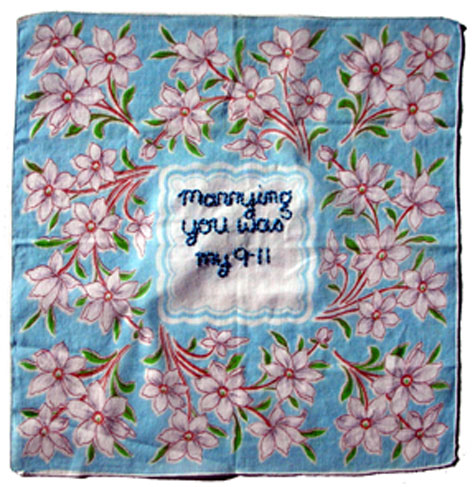
MIXED MESSAGE Raley's "marrying you was my 9/11."
|
One way to keep dry, academic art theorizing from getting too, well, dry and academic is to inject some rock and roll. So it's a relief that "Inappropriate Covers" at Brown University's Bell Gallery (64 College Street, Providence, through May 29), the 11-artist exhibit about "appropriation, reconfiguration, and erasure" as ways of unlocking hidden meaning, includes smashed guitars and goofball album cover mash-ups.
The show was put together by Brown grad students — conceived by Braxton Soderman and Cynthia Lugo and curated by Soderman and Justin Katko. The bad news is that the team's wall labels and catalogue read like a parody of grad-school speak. A sample: "Brian Dettmer's surgical interventions into the book expose topographies of hypertextual juxtaposition, retrieving singular reliefs from a vast array of combinations latent within any one volume."
The good news is that the show includes Dettmer's amazingly altered books. Wonderland of Knowledge (2008) is two stacks of vintage children's encyclopedias cut up, but still holding their shape, to reveal black-and-white illustrations (Egyptian sculpture, zebra, tires, eye, butterfly, buildings, elephant) like strata uncovered by an excavation of dreams.
That's what redeems this show. The curators' logic is somewhat wonky and their official institutional radical tone often isn't borne out by the art, but they have eyes for cool stuff — a mix of neat-o handcraft, gizmos, rock and roll, Robert Creeley poems, and jokes.
Jim Campbell presents devices (ingredients: glass, machines, magic) that make photos of his dad and mom flicker in and out of fogs. They feel like electronic séances. Kenneth Goldsmith's "I don't really remember the words, but I think I recall the punctuation scheme" (2004) wittily riffs on his memory of a Creeley poem — a smattering of commas, dashes, and a period.
L. Amelia Raley embroiders painful statements from a "psychiatric talk show" onto pretty floral handkerchiefs: "Marrying you was my 9/11,""you little hoe bag," and "I want to take my knife to my mother and chop her," from the series I should have never ever ever did those things. Ted Riederer's The Resurrectionists is an ecstatic slo-mo video of people smashing instruments. The soundtrack apparently is performed on the reconstructed guitars and drums, which are on display in the gallery. John Oswald pastes the faces of Elvis, Michael Jackson, and Dolly Parton onto Beatles album covers and slows down a recording of Parton singing "The Great Pretender" to make her sound like a man. They're amusing, dumb jokes, but quickly lose their interest.
Stephanie Syjuco's 153-minute video triptych Body Double (Platoon/Apocalypse Now/Hamburger Hill) (2007) takes the entirety of the three named Vietnam War films and blacks out all but the landscape footage (jungle, rainy rivers), which was actually shot in the Philippines. For the Filipino artist, it's an act of reclamation of her native land. It's a catchy idea, but it quickly becomes dull to watch. Mark Wallinger's video Via Dolorosa (2002) cuts Franco Zeffirelli's 1977 TV miniseries Jesus of Nazareth down to 18 minutes and then hides all but the edges of the frame behind a black square. Soderman and Katko say it's about "the richness of the kinetic data that spills from the margins." To me, it's just irritating.
I frequently see lengthy art videos like this and I've come to believe that nobody (besides the artists themselves) ever watches them in their entirety. I used to make valiant efforts to sit through them, but I've (mostly) stopped because I was missing the point. These are conceptual exercises. To make the idea resonate, it's crucial that the artist pursue the idea to its full conclusion. But once you get the point (usually after a few minutes), you don't need to watch any more because it's the thought that counts.
And then there's the showstopper: Kelly Heaton's The Surrogate (2002-2003), a furry red coat made from 64 skinned Tickle Me Elmo dolls. Inside it's filled with wires making it resemble a suicide bomber's coat. It's actually all the vibrating tickle devices attached to a corset-like structure around what would be the wearer's belly and thighs. The curators explain: "Heaton exposes the wildly popular Tickle Me Elmo to be no more than a laughing vibrator with fur, implicating the marketing of animatronic play with the cybernetic arousals of 'teledildonics.' " Heaton touches on adult and child sensuality/sexuality, but it's more a naughty joke than an exposé. Still, it's a memorably good joke.
Read Greg's blog at gregcookland.com/journal.